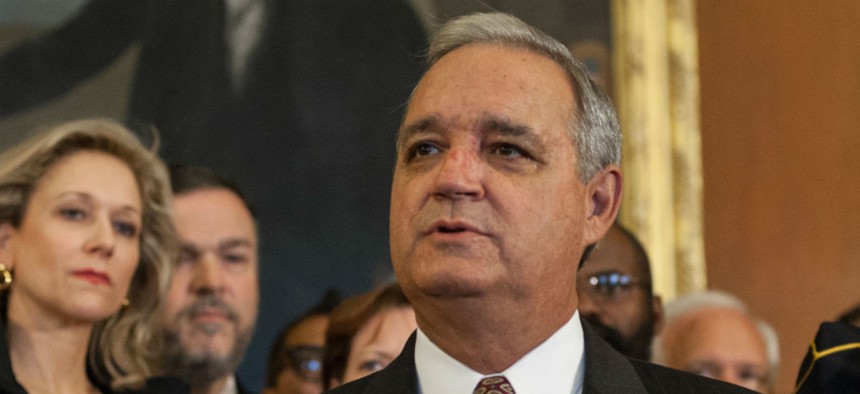
Rep. Jeff Miller, R-Fla., requested an unredacted copy of the records and any benefits claims with the VA. Flickr user Speaker John Boehner
Congressional Committee Seeks Cop Killers' VA Medical Records
It is not clear whether veterans Gavin Eugene Long and Micah Xavier Johnson suffered from PTSD.
The head of a House committee wants the medical and benefits records of veterans Marine Gavin Eugene Long and Micah Xavier Johnson, who shot and killed police officers in Louisiana and Texas earlier this month.
House Veterans’ Affairs Committee Chairman Jeff Miller, R-Fla., has asked the Veterans Affairs Department to brief the panel’s staff and bring unredacted copies of the full medical records and any benefits claims that Long and Johnson filed with the VA.
Miller said that “the committee will not accept any restriction placed on the information provided at the briefing, so please ensure that the VA staff that performs the briefing is prepared to discuss Mr. Long’s care and benefits without limitation,” in a July 21 letter to VA Secretary Bob McDonald. The panel sent a similar letter about Johnson on July 26.
VA spokesman James Hutton said the department received the letter, and would respond directly to Miller. In response to a question about whether any VA policies or laws existed that would prevent the department from providing the personal health and benefits records in full to the committee, Hutton said he "didn't have any more to add at this time."
Long, a former Marine who served in Iraq, ambushed cops – shooting six and killing three -- in Baton Rouge on July 17, nearly two weeks after police officers in that city shot and killed Alton Sterling, an African-American man. Long, who was black, had posted a July 10 YouTube video talking about recent officer-involved shootings of African-Americans across the country. On July 7, Johnson, also a black veteran, shot seven law enforcement officers at a protest in Dallas, Texas, killing five of them. Some of the victims were also military veterans.
Both Long and Johnson were killed by law enforcement during the shooting incidents.
Several news reports have said that neither man was in combat during their military service. Long, who worked as a data network specialist, served in the Marines from 2005 to 2010 and received several awards. Johnson, who was in the Army reserves, served from 2009 to 2015, spending some time in Afghanistan. It is unclear whether either of them suffered from post-traumatic stress disorder.
Veterans quoted in a July 19 story in The New York Times expressed concern that the recent tragedies in Louisiana and Texas would perpetuate the stereotype of ex-service members as damaged or prone to violence.
A 2014 study on Americans’ cultural perceptions of post-9/11 veterans by the nonprofit vet empowerment group Got Your 6 found that 83 percent of respondents believed vets are more likely than civilians to suffer from mental illness, and that 75 percent of vets were more likely than civilians to end their own lives.
The study cited National Institutes of Health and VA statistics that found 7.7 million Americans deal with PTSD in any given year, and between 300,000 and 500,000 vets have struggled with PTSD over 12 years of combat. “Thus, conservatively, more than 95 percent of Americans with PTSD are civilians,” the group’s study said. As for suicide, the study cited a VA statistic that said veterans age 18 to 40 are no more likely to kill themselves than civilians in the same age group.







